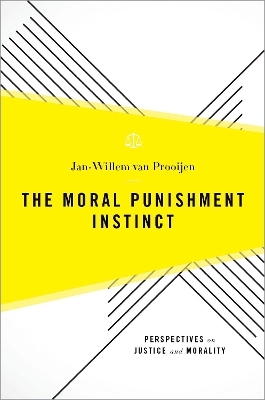
The Moral Punishment Instinct
Seiten
2018
Oxford University Press Inc (Verlag)
978-0-19-060997-9 (ISBN)
Oxford University Press Inc (Verlag)
978-0-19-060997-9 (ISBN)
Why do we universally punish offenders? This book proposes that people possess a moral punish instinct: a hard-wired tendency to aggress against those who violate the norms of their group. This instinct is reflected in how punishment originates from moral emotions, stimulates cooperation, and shapes the social life of human beings.
Punishment of offenders is one of the most universal features of human behavior. Throughout history, ranging across a multitude of cultures including the ancient hunter-gatherers to our contemporary courts of law, it is extraordinarily common for people to punish offenders within their groups. By the same token, it's important to understand that punishment is not only restricted to criminal offenders, but actually emerges within all spheres of our social life, including: corporations, our public institutions, in traffic, during sports matches, in our schools, and more. Punishment strongly influences what we think, how we feel, and what we do.
The Moral Punishment Instinct asserts that people possess this exact instinct within themselves: a hard-wired tendency to aggress against those who violate the norms of their group. We have evolved this instinct because of its power to control our behavior by curbing selfishness and free-riding, thereby providing incentives to stimulate the mutual cooperation that our ancient ancestors needed in order to survive the challenging natural environments.
In this book, Jan-Willem van Prooijen methodically describes how punishment originates from moral emotions, stimulates cooperation, and shapes the social life of human beings. Guided by a host of recognizable and relatable examples, this book illuminates how the moral punishment instinct manifests itself among a variety of modern human cultures, children, the hunter-gatherer tribes, and even non-human animals--all while accounting for the role of this instinct in religion, war, racial bias, restorative justice, gossip, torture, and radical terrorism.
Punishment of offenders is one of the most universal features of human behavior. Throughout history, ranging across a multitude of cultures including the ancient hunter-gatherers to our contemporary courts of law, it is extraordinarily common for people to punish offenders within their groups. By the same token, it's important to understand that punishment is not only restricted to criminal offenders, but actually emerges within all spheres of our social life, including: corporations, our public institutions, in traffic, during sports matches, in our schools, and more. Punishment strongly influences what we think, how we feel, and what we do.
The Moral Punishment Instinct asserts that people possess this exact instinct within themselves: a hard-wired tendency to aggress against those who violate the norms of their group. We have evolved this instinct because of its power to control our behavior by curbing selfishness and free-riding, thereby providing incentives to stimulate the mutual cooperation that our ancient ancestors needed in order to survive the challenging natural environments.
In this book, Jan-Willem van Prooijen methodically describes how punishment originates from moral emotions, stimulates cooperation, and shapes the social life of human beings. Guided by a host of recognizable and relatable examples, this book illuminates how the moral punishment instinct manifests itself among a variety of modern human cultures, children, the hunter-gatherer tribes, and even non-human animals--all while accounting for the role of this instinct in religion, war, racial bias, restorative justice, gossip, torture, and radical terrorism.
Jan-Willem van Prooijen is Associate Professor at the Department of Experimental and Applied Psychology of VU University Amsterdam, and a Senior Researcher at the Netherlands Institute for the Study of Crime and Law Enforcement (NSCR).
Preface
Chapter 1 Introduction
Chapter 2 Motives for Punishment
Chapter 3 Reason or Intuition?
Chapter 4 Origins of the Moral Punishment Instinct
Chapter 5 Punishment and Cooperation
Chapter 6 When Punishment Backfires
Chapter 7 Black Sheeps versus Ingroup Favoritism
Chapter 8 Punishing Dangerous Outsiders
Chapter 9 Revenge, Gossip, and Restorative Justice
Chapter 10 Conclusions and Implications
Notes
References
Index
| Erscheinungsdatum | 15.03.2018 |
|---|---|
| Reihe/Serie | Perspectives on Justice and Morality |
| Verlagsort | New York |
| Sprache | englisch |
| Maße | 244 x 155 mm |
| Gewicht | 476 g |
| Themenwelt | Geisteswissenschaften ► Philosophie ► Allgemeines / Lexika |
| Geisteswissenschaften ► Psychologie ► Sozialpsychologie | |
| Recht / Steuern ► Strafrecht ► Kriminologie | |
| Sozialwissenschaften ► Soziologie ► Allgemeines / Lexika | |
| Wirtschaft ► Volkswirtschaftslehre ► Mikroökonomie | |
| ISBN-10 | 0-19-060997-4 / 0190609974 |
| ISBN-13 | 978-0-19-060997-9 / 9780190609979 |
| Zustand | Neuware |
| Haben Sie eine Frage zum Produkt? |
Mehr entdecken
aus dem Bereich
aus dem Bereich
die letzten Jahre der Philosophie und der Beginn einer neuen …
Buch | Hardcover (2024)
Klett-Cotta (Verlag)
CHF 39,20
Gesundheitsschutz, Selbstbestimmungsrechte, Rechtspolitik
Buch | Softcover (2024)
Kohlhammer (Verlag)
CHF 54,60
Jenseits von Identität | Ausgezeichnet mit dem Leipziger Buchpreis …
Buch | Softcover (2023)
Ullstein Taschenbuch Verlag
CHF 19,55


